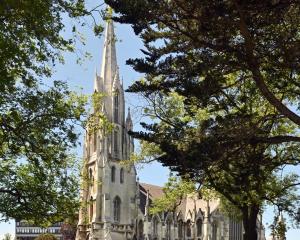
Walking around the quiet — indeed, all too quiet — greenery of the University of Otago, one cannot help but feel at some remove from the images that are currently coming out of American and European universities.
Each day brings new footage of students and faculty members being beaten, handcuffed, corralled, and denied their basic civil rights of free speech and peaceful assembly, to express dissent against power that is being abused for the most hideous of crimes.
However, the truth is, this kind of violent response to peaceful protest is nothing new.
Throughout history, those people who have been most serious about using these much-vaunted civil rights to push their societies to honour the moral universalism and commitments to human dignity that underpins those rights have often been the most vilified and most persecuted.
Among many other examples, such vilification was directed against the Chartists pushing for enfranchisement at Peterloo in 19th-century England, against abolitionists committed to the ending of slavery, against the suffragettes who wanted political rights for women, against those who protested against American slaughter in Southeast Asia, and against those who raised their voices against apartheid in the Jim Crow South and South Africa.
Derision and dismissal have also been directed at the anti-capitalist Occupy protesters and, more recently, environmental protesters seeking to avert the climate crisis.
At each of these historical moments, committed groups of people took a stand against a status quo they regarded as unjustifiable and wrong. And, at each of these moments, others — often the majority — responded with ridicule, scorn, indifference and sometimes even violence.
Much of the wider society assumed that these movements were populated by nothing more than agitators, and committed to nothing less than the destruction of all that was good and holy.
Now we recognise these people and their movements as having acted in the interests of humanity and for the good of all. In other words, at each stage of our collective history, it was the protesters and activists who were most serious about the commitments we all profess to hold to — moral universalism, universal human rights, the inherent dignity of human beings.
This seriousness is why they felt compelled to put their bodies on the line using peaceable assembly and free expression, even when those in power did not honour those rights.
This is not to say that every demonstration or protest was completely free of violence, or that some parts of the movement weren’t also committed to pursuing their goals by any means, including armed struggle.
A forgotten part of the suffragette movement was the use of violent actions we would call terrorism, such as fire-bombings. The anti-apartheid movement in South Africa engaged in both armed struggle and mass nonviolent resistance.
But even in such cases, these movements were committed to liberal values of free expression, peaceful assembly, human rights, and the pursuit of human dignity.
In considering this history of protest, it also behooves us to ask how we should regard those who supported and benefited from systemic injustices.
Indeed, we need to ask how we should consider those who continue to advocate for fossil fuels today, or indeed, those who defend "Israel’s right to defend itself" while it commits a genocide in plain view.
Whatever moral progress we have made over the millennia must surely encourage us to perform a little actuarial work, through which we might take stock of the movements and individuals that have, at key moments in our collective histories, pushed us toward honouring what we now regard as common sense positions.
Therefore, when we stand idly by as state and vigilante violence is used against people who are peaceably protesting to uphold the universal human rights we all believe in, we are not just harming those individuals — egregious though such harms are — we are also harming ourselves. We are standing on the neck of those individuals who are trying to get us to live in accordance with our own ideals and aspirations. We are impeding progress towards a more equal, more just and more peaceful world. We are putting ourselves on the wrong side of history.
Indeed, given that the ideals we all hold are coming increasingly under threat from a number of sources, not least far-Right populist leaders, the rise of disinformation and growing inequality, we must pay extra special attention to those people and groups who are, once again, making the kinds of sacrifices that are forging and smelting the moral compasses we so desperately need.
A decade from now, if not sooner, it will be widely accepted and no more than common sense that Palestinians are human beings too, and they deserve the same equal rights, the same equal treatment under the law and the same self-determination that other human beings enjoy.
On that day, the student protests we are witnessing today will be praised and celebrated as courageous and progressive expressions of the values we hold dear, just as we venerate today the abolitionists, the suffragettes, the union movement, the civil rights movement, the anti-apartheid movement, the marriage equality movement, and many, many more.
History is on the side of the students.
— Dr David Jenkins is a lecturer in political theory at the University of Otago; Richard Jackson is a professor of peace studies at the University of Otago.










